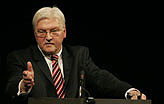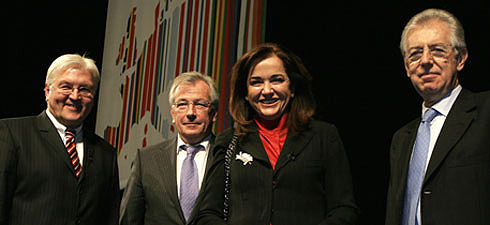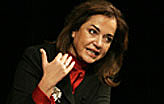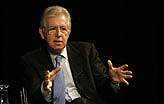As Henning Schulte-Noelle, Chairman of the Allianz SE Supervisory Board joined forces with theater manager Dieter Dorn and Süddeutsche Zeitung editor-in-chief Hans Werner Kilz to launch the 2007 Allianz Lectures, he noted that a full auditorium on a Sunday morning was not exactly redolent of apathy concerning Europe. The Allianz Cultural Foundation is once again working in close cooperation with the Süddeutsche Zeitung and the Bavarian State Theater to organize this second lectures series.
With Germany having recently taken over the European Council presidency, the people of Germany are once again becoming more aware of European issues. Add to that the fact that 2007 is the 50th anniversary of the signing of the Treaties of Rome establishing the European Economic Community and the successful completion of the fifth round of enlargement marked by the accession of Bulgaria and Romania to the EU at the beginning of the year, and there is plenty of material for thought-provoking debate.
Prominent politicians discuss visions for Europe

The world's biggest success story
"The era of small nation states has passed," declared Frank-Walter Steinmeier in his first major political speech since Germany took over the EU Council presidency. This is also down to us having achieved European unity, the greatest success story the world has seen in the last 50 years.
A success story that is at odds with the Euroskepticism that has become widespread, he continued. This is why the media must be more passionate in their endeavors to keep us informed, because people often feel they simply do not know enough, believes Steinmeier. And yet the EU is one of the best things to ever come out of Europe. "Creating a united Europe is the right way, indeed perhaps the only way to respond to globalization, the greatest challenge of our time," he said.
He believes Germany has profited more than other country from the eastern enlargement of the EU. Furthermore, if Europe really wants a "true neighborhood policy," then it must also develop strategic concepts for neighboring countries and regions, because the more countries follow the European model, the better it will be for all.

Left to right: German Foreign Minister Steinmeier, Hans Werner Kilz, Greece's Foreign Minister Bakojannis and Mario Monti; Photos: Robert Haas
Accession opportunities for Turkey, partnership with Russia
Steinmeier also highlighted the EU's relationship with its neighboring states, insisting that as well as building relations with the Maghreb states, the EU should give Turkey a fair chance of accession. As an EU member, Turkey could act as a bridge to a tolerant, "enlightened Islam on the south-eastern tip of our continent." According to Steinmeier, casually allowing this historic opportunity to slip by would be a mistake of momentous proportions.
Partnership with Russia is another important but difficult topic, Germany's Foreign Minister acknowledged, because the country's democratic record is still far from perfect. Yet Europe's relations with Russia are a long-term venture, driven on the one hand by the desire to secure energy provision, but also motivated by the fact that Europe has considerable economic interests in Russia and wants to share in its developing prosperity.
Germany must become more international
For Germany, the fall of the Berlin Wall and the end of the postwar period brought with it the end of the former Federal Republic's special status and greater responsibility; even conflicts in far-off countries now directly affect Germany, said Steinmeier. "Germany must become more international," he demanded. "Nowadays 'staying out of things' is simply no longer our prerogative."
In his closing remarks, Steinmeier noted there is much work to be done, conceding that visions for Europe are projects that will take up the next 20 to 30 years and citing a future European army as an example. He also noted that this century could well see the disappearance of national foreign ministers, that the "German foreign minister" is probably a dying breed.

Greece wants a Constitution and less "technocracy"
Steinmeier's Greek counterpart Bakojannis spoke next. Having studied in Munich, she spoke in perfect German, quoting Bismarck and Churchill and making the case for a strong Europe. Greece supports the European Constitution, she said, and would be disappointed if it were not ratified by all. If this were to happen, then a "mini-constitution" would be the best way of still achieving a consensus on a broad basis.
She believes EU expansion is both a success story and a challenge, for in order for 27 member states to move forward together, modernization, greater transparency and more plain speaking from the institutions are urgently needed. She thinks Europe needs "more politics and less technocracy."
Send a clear message to Turkey
It came as a surprise to some of her listeners when Dora Bakojannis spoke out in favor of Turkey's accession to the EU, explaining that a democratic and European Turkey that embraces an enlightened Islam would ensure stability and security for Europe and Greece.
The EU should send a clear message to Turkey, saying "full compliance equals full membership – if you fulfill all the conditions, we will allow you to join." That is not the case today, she said, but also noted that Turkey should not expect special treatment.
"Mini-constitution, maximum progress"?
Italy's Mario Monti agreed with the Greek Foreign Minister that given the rejection of the European Constitution by France and the Netherlands, a "mini-constitution" could be seen as a "maximum progress." Steinmeier was more reticent on this point, explaining that as President of the European Council, Germany felt an obligation to the 18 states that had already ratified the Constitution. Berlin will issue constructive proposal for EU reform in June, he said.
Former EU Commissioner for competition and the internal market Monti also spoke out against the heads of government who try to block international mergers in order to protect national interests. He also highlighted the fact that nowadays, the USA takes Europe seriously in three areas. These are trade, competition and financial policy, and despite our occasional differences, we have managed to build cooperation based on mutual trust, he said.
Monti also rejected Bakojanni's accusation that EU politicians are not accountable enough, saying that many people underestimate the power of the European Parliament and asserting that the European Parliament calls the EU Commission to account far more than national parliaments do their executives.

To be continued
The second Allianz Lecture of this series is due to take place on January 21. Maria Böhmer, Federal Government Commissioner for Migration, Refugees and Integration and Professor Werner Schiffauer will join a German-Russian author, an Afro-German pop singer and a young imam from Bavaria to discuss strategies for improving the integration of the EU's foreign residents.
Supervisory Board Chairman Henning Schulte-Noelle declared himself extremely pleased with the inaugural event, saying "I am delighted that the second round of Allianz Lectures has begun, for after all, one of the main aims of the Allianz Cultural Foundation is to promote a united Europe. The inaugural event was as great success and I look forward immensely to the lectures taking place over the next few weeks."